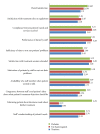Evaluation of a pilot medication-assisted therapy program in Kazakhstan: successes, challenges, and opportunities for scaleup
- PMID: 23289082
- PMCID: PMC3529415
- DOI: 10.1155/2012/308793
Evaluation of a pilot medication-assisted therapy program in Kazakhstan: successes, challenges, and opportunities for scaleup
Abstract
Study Aims. Evaluate the quality and effectiveness of the medication-assisted therapy (MAT) pilot in Kazakhstan and review implementation context and related challenges. Methods. We performed a desk review of MAT policy and program documents and reviewed medical records at three MAT sites in Kazakhstan. MAT patients (n = 93) were interviewed to assess their perceptions of the program and its impact on their health, criminal, drug use, and HIV risk related behaviors as well as expenditures on nonprescribed psychoactive drugs. Persons injecting drugs who are not in treatment, MAT program staff, and other stakeholders were interviewed to obtain their perspectives on MAT. Results. Legislation supports introducing MAT as a standard of care for treatment of opioid dependence; however, its progress has been hampered by active opposition. Inadequate access and coverage, insufficient supply management, scarce infrastructure of narcological facilities, limited opportunities for staff development, and restrictive methadone dispensing policies compromise the quality of the intervention and limit its potential benefits. There were significant reductions in criminal, drug use, and HIV risk related behaviors in patients receiving MAT. Conclusions. The MAT pilot in Kazakhstan demonstrated its feasibility and effectiveness in the local context and is recommended for scaleup throughout the country.
Figures







References
-
- Republican AIDS Center. Report on Activities of the AIDS Service in 2011. Almaty, Kazakhstan: 2012.
-
- WHO. Global HIV/AIDS Response—Epidemic Update and Health Sector Progress Towards Universal Access—Progress Report. Geneva, Switzerland: 2011.
-
- WHO. Guidelines For the Psychosocially Assisted Pharmacological Treatment of Opioid Dependence. Geneva, Switzerland: 2009. - PubMed
-
- Marsden J, Stewart D, Gossop M, et al. Assessing client satisfaction with treatment for substance use problems and the development of the treatment perceptions questionnaire (TPQ) Addiction Research and Theory. 2000;8(5):455–470.
-
- Darke S, Hall W, Wodak A, Heather N, Ward J. Development and validation of a multidimensional instrument for assessing outcome of treatment among opiate users: the Opiate Treatment Index. British Journal of Addiction. 1992;87(5):733–742. - PubMed
Grants and funding
LinkOut - more resources
Full Text Sources

